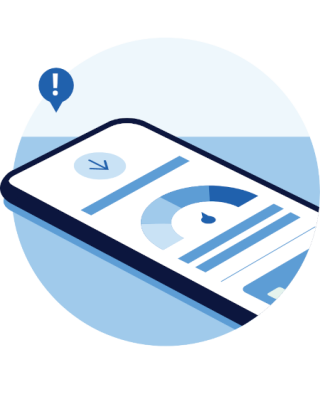
Over-the-phone payments can be more prone to fraud than those made in person or online, but there are steps you can take to protect yourself.
Updated May 31, 2023 7:56 p.m. PDT · 1 min read Written by Funto Omojola Lead Writer Funto Omojola
Lead Writer | Credit cards
Funto Omojola started writing for NerdWallet in 2020. Before joining NerdWallet, she covered personal finance-related topics for financial websites and organizations and has over five years of experience writing about money. Her writing has been featured in MarketWatch, Yahoo Finance, Realtor.com, New York Post, and Nasdaq, among others. Funto earned a bachelor's degree in global and international studies and an MFA from Bard College. She is based in Brooklyn, New York.
Assigning Editor Kenley Young
Assigning Editor | Credit cards, credit scores
Kenley Young directs daily credit cards coverage for NerdWallet. Previously, he was a homepage editor and digital content producer for Fox Sports, and before that a front page editor for Yahoo. He has decades of experience in digital and print media, including stints as a copy desk chief, a wire editor and a metro editor for the McClatchy newspaper chain.
Fact Checked
Many, or all, of the products featured on this page are from our advertising partners who compensate us when you take certain actions on our website or click to take an action on their website. However, this does not influence our evaluations. Our opinions are our own. Here is a list of our partners and here's how we make money.
Mobile and online credit card transactions have made over-the-phone payments somewhat rare. Still, there are instances where it might make sense for you to pay this way — when ordering takeout, for example, or paying a bill from a small-business owner.
But the level of risk with over-the-phone payments can be somewhat higher than when using your credit card online or in person, as remote transactions can make it difficult to verify a merchant’s identity.
Here's what to know to limit your susceptibility to fraud when making payments this way.
Stop fraud in its tracksWith a NerdWallet account, you can see all of your credit card activity in one place and easily access your credit report to spot any red flags quickly.
GET STARTED
Any credit card transaction is potentially vulnerable to fraud . But unlike payments made in person or even online, cardholders and vendors alike aren't necessarily able to verify whether the person at the other end of the line is, in fact, who they say they are.
When you make a transaction by phone, you're typically required to provide the vendor with sensitive information because your card can’t be swiped:
Your name as it appears on the card. Your card number. The expiration date. The card's security code, or CVV . Sometimes your billing ZIP code.With remote transactions, it can be difficult to confirm that you're giving out such sensitive information to the intended merchant and not to a fraudster. And protections that could otherwise lessen this risk won't be of much use in an over-the-phone transaction.
A signature, photograph or encrypted card chip, for example, can't be physically verified in these types of scenarios. Even the CVV, or "card verification value," won't be a fail-safe.
If you find yourself a victim of fraud — whether from a transaction over the phone, in person or online — know that you're better protected when you use a credit card than you would be with a debit card.
That's because federal law limits consumers’ liability for credit card fraud to a maximum of $50, and most credit card issuers have $0 liability policies . So while the credit card issuer and/or the merchant may take a loss, it’s unlikely you'll be out any actual money, as you could be if your debit card were compromised.
But reporting the fraud to your issuer, freezing an existing card, ordering a new one and then changing all of your autopay accounts to an updated card number? Those are headaches you can do without. And there are ways to avoid them.
There are steps you can take to mitigate the risks of fraud from over-the-phone credit card transactions.
You call them, not the other way around. Never provide your credit card information to representatives who call you unexpectedly. Criminals can claim to be from your card issuer or bank and ask for your personal information. To this end, provide necessary card information only to merchants you've called directly. And before making any transactions, confirm that you've dialed the vendor’s correct phone number.
Double-check the charge before hanging up. When making purchases over the phone, you can't physically see the products you're buying. So after you’ve placed your order, ask the merchant to confirm what you’re being charged for and the exact amount of the transaction. You can also ask for an order confirmation number.
Monitor your account. Review your credit card statement often to check for any fraudulent or suspicious activity and to make sure your transactions are being charged correctly. You might even want to log in to your card account immediately after placing an order to ensure the correct charge appears as "pending."
Use your card's prevention tools. Take advantage of your card's additional security settings. Features like virtual card numbers and account alerts can help ward off fraud, and card lock can help if you find you've been victimized.
About the authorYou’re following Funto Omojola
Visit your My NerdWallet Settings page to see all the writers you're following.
Funto Omojola is a writer at NerdWallet. Her work has been featured in MarketWatch, Yahoo Finance and Nasdaq. See full bio.
On a similar note.

Download the app

Disclaimer: NerdWallet strives to keep its information accurate and up to date. This information may be different than what you see when you visit a financial institution, service provider or specific product's site. All financial products, shopping products and services are presented without warranty. When evaluating offers, please review the financial institution's Terms and Conditions. Pre-qualified offers are not binding. If you find discrepancies with your credit score or information from your credit report, please contact TransUnion® directly.
NerdUp by NerdWallet credit card: NerdWallet is not a bank. Bank services provided by Evolve Bank & Trust, member FDIC. The NerdUp by NerdWallet Credit Card is issued by Evolve Bank & Trust pursuant to a license from MasterCard International Inc.
Impact on your credit may vary, as credit scores are independently determined by credit bureaus based on a number of factors including the financial decisions you make with other financial services organizations.
NerdWallet Compare, Inc. NMLS ID# 1617539
California: California Finance Lender loans arranged pursuant to Department of Financial Protection and Innovation Finance Lenders License #60DBO-74812
Insurance Services offered through NerdWallet Insurance Services, Inc. (CA resident license no.OK92033) Insurance Licenses
NerdWallet™ | 55 Hawthorne St. - 10th Floor, San Francisco, CA 94105